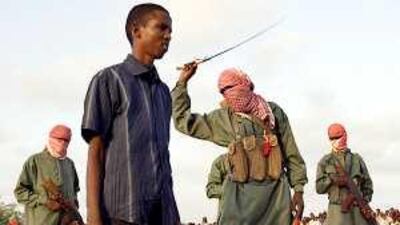NAIROBI // A brutally violent Somali militia showed this week that it has a humane side. Sort of. Al Shabab, a hardline Islamist insurgent group that is fighting the government and wants to impose strict Islamic law on Somalia, postponed amputations on four young thieves on Tuesday, citing the weather as creating a health risk. An Islamic court in an al Shabab-controlled area of Mogadishu found the men guilty of stealing guns and mobile phones. They were sentenced Monday to have their right hand and left foot cut off in accordance with a form of Sharia, or Islamic law. However, the court ruled on Tuesday that the amputations could not take place because the sweltering weather would have caused the accused to bleed to death. Officials said that the sentence would still be carried out, although no new date was given. "The sentence will be carried out later," an al Shabab official told the Associated Press anonymously because he was not authorised to speak to the media. "It was postponed because of the hot weather and fears that the victims will bleed to death." But, analysts say, just because al Shabab postponed the amputations does not mean the militia has gone soft. The insurgent movement, which the United States says is linked to al Qa'eda, has fought a brutal two-year war with the government, forcing millions to flee parts of south-central Somalia. The United Nations says 160,000 have been displaced in the past two months of intense fighting. Al Shabab and an allied Islamic militia control much of the country while the government, backed by African Union peacekeepers, clings to a few pockets of Mogadishu, the shell-shocked capital. In areas controlled by the Islamists, violent justice is occasional but shocking to the outside world. At least two amputations have been carried out this year in the al Shabab-controlled southern city of Kismayo. The most recent one, in May, was held in a public square. The severed hand of the accused thief was held on display for the large crowd to see. Public floggings and executions also occur in militant-controlled regions. In October, a 13-year-old girl was gang raped, according to an Amnesty International investigation. When she reported the rape to al Shabab authorities, she was accused of adultery and sentenced to death. A group of 50 men stoned her in a stadium while 1,000 spectators watched. Al Shabab claims that such harsh punishment and Sharia are necessary to restore order to Somalia, where a civil war has raged for 18 years. The Islamists briefly controlled the country in 2006 but were routed after six months by Ethiopian troops supported by the United States, which thought Somalia would turn into a type of Taliban-controlled Afghanistan. "Once we eradicate the big enemy from an area, smaller enemies appear," Sheikh Hussein Ali Fidow, an al Shabab official, told the Voice of America news agency. "We arrested them for robbing people and they have been sentenced to have their hands and legs amputated. We will not use such sentences to target any particular tribe or group, but we are implementing Sharia law." Amnesty International has called this type of punishment "cruel and degrading". Bénédicte Goderiaux, an Africa researcher with Amnesty, said al Shabab has also been accused of kidnapping foreigners, killing journalists and shelling civilian population centres. "You have an armed group that claims to be restoring law and order," she said, "but there are many things they could do to restore order - like stop targeting civilians." Somalis typically practise a moderate form of Islam. In the past two years, the insurgents have introduced Wahabism, a version of Islam practised by Osama bin Laden and the Taliban. Some Somalis have chosen to accept this practice and the harsh Islamic law that comes with it either out of fear or because they feel there is no alternative, said Owuor Olungah, a professor at the University of Nairobi's Institute for African Studies. "The people of Somalia have suffered so long in their situation that they will look towards any movement that they think will lead to peace," he said. "Across Africa, people get fed up with the clogged justice system and sympathise with people that take the law into their own hands." Prof Olungah said the amputations may have been postponed this week to send a message to neighbouring countries "that al Shabab is human". The Somali government last week called on Kenya and Ethiopia to send troops to fight the rebels. Ms Goderiaux said that perhaps the amputations were postponed because of pressure from international human rights groups. "We don't know the real reason," she said. "It's important to keep putting pressure on them." mbrown@thenational.ae

Show of mercy may be calculated
Observers say Somalia's al Shabab Islamist insurgents may be trying to project a more humane image to neighbouring states.
Most popular today
9
